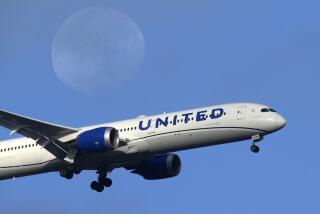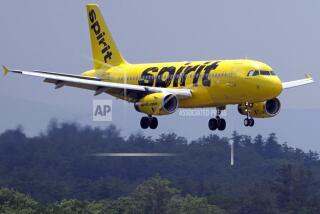Benefits of United-Continental merger are up in the air
- Share via
As expected, United Airlines and Continental Airlines announced Monday that they’re climbing into the cockpit together, creating the world’s largest carrier. And, as expected, the two companies said this would result in “best-in-class customer service” for passengers.
Yeah?
Not to be a Gloomy Gus as the wedding bells are still ringing, but can anyone think of a single major merger that’s resulted in better service (never mind lower prices) for consumers? Maybe among phone companies? Cable companies? Other airlines?
“I’m trying to think of any good things for passengers here,” said Charlie Leocha, director of the Consumer Travel Alliance, a passenger-advocacy group. “Basic economics say that any time there’s less competition, it’s not good for consumers.”
Christopher Elliott, a widely published travel writer and consumer advocate, seconded that opinion.
“United and Continental are not merging for consumers’ health,” he told me. “They’re merging for their health.”
The combo, Elliott added, “will mean less competition and inevitably higher fares.”
It will probably also accelerate the trend that air travelers have grown all too familiar with: the nickel-and-diming of passengers with fees for everything the airlines can think of.
We’re already paying extra for amenities such as pillows, blankets and headsets. Food? That’ll cost extra, as will checking a bag. And don’t bother trying to pay with cash while cruising at 30,000 feet; most carriers will now take only plastic.
Spirit Airlines is positioning itself as the king of penny pinchers. First it said it will start charging up to $45 for carry-on bags stowed in overhead bins. Now the airline says it will introduce “pre-reclined” seats that in fact don’t recline at all.
The stay-in-place seats will allow Spirit to stuff more passengers onto flights. That’s undoubtedly a good thing for the carrier. But does anyone think it will make for a more pleasurable travel experience?
“The airlines say they’re just giving passengers what they want: low fares,” Elliott said. “But is that all we want? No. We also want a little comfort and a little dignity.”
Pablo Spiller, a professor at UC Berkeley’s Haas School of Business who specializes in the airline industry, said travelers have only themselves to blame for the state of things. By demanding low-low-low fares first and foremost, we insist that airlines compete solely on price, not service.
“If passengers really wanted better service, the airlines would offer it,” Spiller said.
That’s undoubtedly true. So the real question is: How miserable are we prepared to be for the sake of saving a few bucks getting from one place to another?
My hunch is that Spirit Airlines and its bargain-basement brethren will ultimately win out. We’ll pay for the cheapest, least-comfortable seats that carriers can get away with, and everything else will cost extra, including, I have little doubt, bathrooms.
David Stempler, president of the Air Travelers Assn., said the consolidation will continue, and it’s likely that only three so-called legacy carriers will survive: United, Delta and American. They’ll make the bulk of their money on international routes.
“That’s the real home run for this merger,” Stempler said. “The legacy carriers will tighten their focus on international travel.”
Meanwhile, lower-fare regional carriers will engage in a race to the bottom for domestic passengers, turning the once-friendly skies into a network of airborne Greyhound buses.
Elliott, the travel writer, saw no reason to disagree with that forecast. The only difference, he said, is that “the carriers will make Greyhound look good by comparison.”
United and Continental painted a rosy picture Monday of what we can expect from their nuptial.
“This combination will provide a strong platform for sustainable, long-term value for shareholders, opportunities for employees, and more and better scheduled service and destinations for customers,” said United Chief Executive Glenn Tilton, who will become chairman of the merged airline.
Maybe. But I think we can all be forgiven for thinking that a bad situation just got that much worse.
David Lazarus’ column runs Tuesdays and Fridays. He also can be seen daily on KTLA-TV Channel 5. Send your tips or feedback to david.lazarus@latimes.com.
More to Read
Sign up for The Wild
We’ll help you find the best places to hike, bike and run, as well as the perfect silent spots for meditation and yoga.
You may occasionally receive promotional content from the Los Angeles Times.







